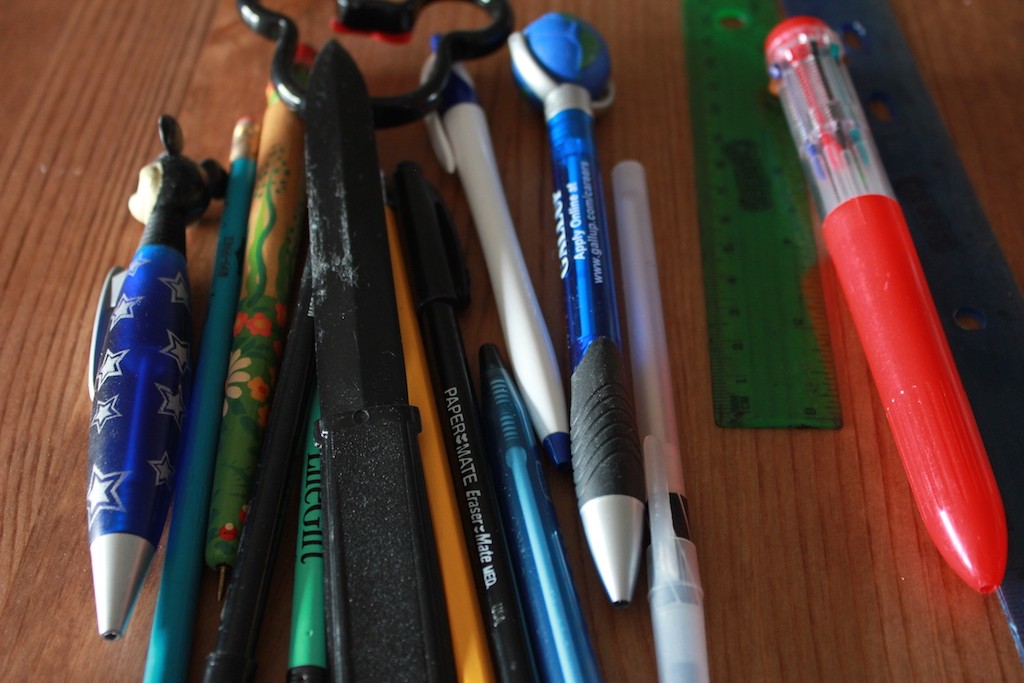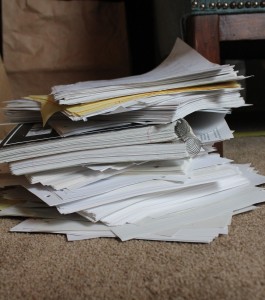Lately I have been slowly undertaking a project of sorting out my belongings. This is because, at age 30, I still have never moved all of my possessions out of the house where I grew up. Like many people, when I ‘moved out’ from home during college, I didn’t permanently move all of my belongings. Nor did I do so when I ‘moved out’ to live in an apartment of my own while I worked after university. And I certainly didn’t when I moved overseas for graduate school, taking only a few suitcases with me. Finally, because I also got married overseas, even marriage didn’t result in actually moving all my stuff out of the house where I’d grown up. However, over the last few years, having my belongings in multiple locations has increasingly made me feel fragmented, and I think it’s time to get them all in one place and organised.
I began the process of going through things after Mike and I moved this spring, now that we are finally close enough to my childhood home to make ‘moving out’ more possible. To get me started, my mom brought me a few boxes of my things. They contained an assortment of craft supplies, half-finished sewing projects, memorabilia, old computer equipment, and a lot of pens. Much of the boxes’ contents I had barely looked at since moving overseas now nearly seven years ago. As I sorted through the boxes, I jotted down my thoughts in response to the objects I touched, surprised as by how evocative they were of my past, and also how conflicted I was towards them and what to do with them.
You see, I’ve known for a long time that ‘sorting out my stuff’ in one place would require actually getting rid of a lot of it. This is not only because it won’t fit into our current space, but because more and more I realise that my relationship with what I own changes with time, and not everything can or should be kept indefinitely.
So many things have passed through my hands lately and out of my home, and I suspect that will continue. Here are a few things I’ve pondered in the sorting.
For good or ill, most physical things in my life are not scarce. There was a phase in my teenage years when I started receiving ‘grown-up’ gifts: candles, lotion, stationery, photo frames, little trinket boxes. At the time, these objects were special treasures because they were the firsts of their kind that I owned for myself. But as I’ve lived longer, I’ve realised that none of these objects are scarce. Not that they aren’t meaningful for other reasons, perhaps, but I’ve been disillusioned of my adolescent belief in their rarity. There will always be plenty. This is even more true of those inexpensive things that seem to multiply – pens, stationery, keychains, socks.
I am too quick to think my space is too small. As I said, I’ve had to discard many things simply because our current home can’t house them all. It’s tempting to think, ‘But when we move into a house (not an apartment), we’ll have more room, so I should keep all this stuff for now. It’s only crowded because we don’t have enough room.’ Yet I suspect that this perennial anticipation of more space is a way of denying the real problem, which is not a deficit of space but a surplus of things. I think there is a potent Western (or perhaps American) cultural narrative that makes us imagine that our homes will always be bigger in the future, without seriously examining whether they are perhaps totally adequate to the present. And yet, honestly, I can only think of about one time in the last 10 years of renting that my space has actually been too small for my needs, even for reasonable comfort. Moreover, in a remarkable way, I do think that if I match the contents of my space to the size and capabilities of the space itself, I typically end up with just the right amount of everything.
I keep too many things as ‘records’ of processes because I’ve failed to recognise the final result. I have always been a stickler for keeping drafts of written work, often carefully numbered in sequence, long after the piece is finished. I do this even though the thought of ever wanting to trace the development of a finished piece, through its drafts, is a bit nauseating. It struck me for the first time recently this is a mistaken approach: that drafts are merely there to facilitate the final work, which is really the only thing worth keeping once it’s complete. Likewise, I came across my Old English language notes and realised that, in anxiously keeping them, I was forgetting that I learned Old English – that was the purpose of the notes. The product of my study wasn’t a set of notes, it was a skill. And in so many other areas, I have begun to ask myself, ‘What was the goal, the product, the purpose, the result of this?’ Acknowledging it usually makes it clear that I am keeping scraps of the process almost in lieu of confidently appreciating its purpose. At one point I kept every scrap connected to my relationship with Mike – every receipt from when we ate out together, every movie ticket, museum admission sticker… One day, I realised that I have a wedding ring to prove that all those other events took place and served their purpose; indeed, more to the point, I have the husband himself! I don’t need a receipt in proof that we ate out together.
As you can see, the process of sorting through one’s belongings can be – as Marie Kondo* suggests – wonderfully meditative and revealing. It’s something I haven’t always done effectively, but am now learning to do better.
*The Life-Changing Magic of Tidying Up: The Japanese Art of Decluttering and Organizing


One thought on “Me, My Stuff, and I”